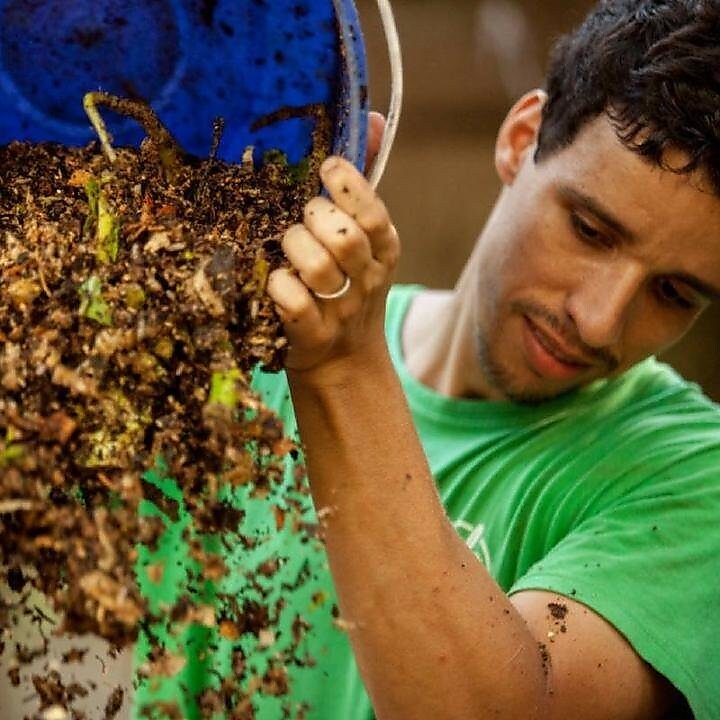
Ciclo Orgânico: Biking Away Food Waste
Jun 18, 2019
This 2017 Top Ten Innovators awardee and Let’s Go Trade recipient transforms food waste into rich, productive soils.
Food waste is a significant – and often overlooked – contributor to climate change. In fact, if food waste was a country, it would rank third in terms of the world’s largest greenhouse gas emitters. Tackling food waste could bring the world significantly closer to meeting the goals set in the Paris Agreement. That’s where Ciclo Orgânico comes in.
Ciclo Orgânico is a subscription based, bicycle powered, urban composting service in Rio de Janeiro. Customers pay a small monthly fee and in exchange, they receive an 18-litre bucket with a compostable bag to collect food scraps. Ciclo Orgânico collects the waste buckets, using their specially adapted bicycles to deliver the buckets to a local composting site where the food waste is transformed into rich, fertile soils. Customers can then choose to keep this soil for their own use or donate it to one of several local community garden projects.

“We envision a community where waste is seen as a resource and instead of a problem, it is seen as a solution,” said Lucas Chiabi, Ciclo Orgânico founder.
To bring their community closer to this vision, Ciclo Orgânico runs a number of educational and outreach programmes. For example, Ciclo Orgânico runs a regular “volunteer day.” On this day, people interested in learning more about composting spend an entire morning with a member of the Ciclo Orgânico team. They then learn firsthand about the composting process and can start their own composts and gardens at home.
Ciclo Orgânico also brings their mission to public schools, giving guided tours of their composting facilities to young students in order to nurture a commitment to sustainability in future generations.
Chiabi joined the Shell LiveWIRE network in 2015 as participant in their Brazil programme -- Shell Iniciativa Jovem. At the time, Ciclo Orgânico was still a bright idea but with Shell Iniciativa Jovem support, this idea transformed into a business.
“Shell LiveWIRE was fundamental to the start and development of the business,” said Chiabi. “From helping shape the initial concept to planning and execution, the programme was invaluable in transforming the idea into a business.”
Over the next two years, he continued to refine and grow this new business. And in 2017, the Ciclo Orgânico competed in Shell LiveWIRE’s Top Ten Innovators Competition, a global competition that highlights and rewards LiveWIRE businesses that demonstrate excellence in innovation. Ciclo Orgânico took home the merit award and $5,000 USD in prize funding.
“The Top Ten Innovators Award was an important recognition of our work, and also an incentive to continue being an innovative business,” said Chiabi.
Chiabi also received a $3,000 USD Shell LiveWIRE Let’s Go Trade grant that year. Let’s Go Trade grants allow Shell LiveWIRE entrepreneurs to undertake international trade visits to open up new markets, learn from their peers in other countries, and accelerate innovation within their businesses.
Chiabi chose to use his grant to visit New York in the United States, home of the world’s most advanced municipal composting operation, in order to learn about innovative composting techniques that could help him improve the efficiency and sustainability of his operations.
He said the Let’s Go Trade grant was critical in helping him strengthen his business.
“Being able to share the challenges and solutions with experts in the industry was invaluable,” he said. “The experience and lessons learned during my visit far exceeded my expectations, and it clearly support the development of my business.”
With these two awards, Ciclo Orgânico was able to leverage these two awards into additional investment totalling $120,000 USD. They have seen a 68 percent increase in revenue within 10 months and also developed a larger scale composting facility, which allowed them to process five times the amount of waste each month.
Today with 650 subscribers, Ciclo Orgânico has diverted over 240 tonnes of food waste from landfills and helped their community avoid roughly 185 tonnes of CO2 emissions to date, bringing the world closer to a low carbon future. And they’re just getting started.